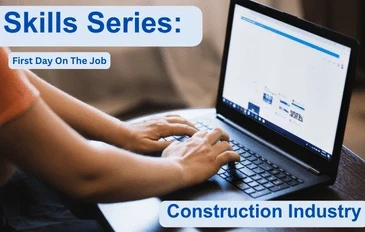Skills Series: Starting Your New Job

Skills Series: Starting Your New Job:
Starting a new job can be both exciting and overwhelming. In the construction industry, there are many things to learn, people to meet, and projects to become familiar with.
This article will provide strategies for navigating your first days on the job, building relationships with your colleagues, and setting goals for your career development.
These first few days will provide you an opportunity to lay the foundation for a successful career.
Navigating Your First Days
The first few days on a new job can be stressful, but it’s important to make a good impression and get off to a strong start. Here are some strategies for navigating your first days:
- Get organized: Take time to organize your workspace, review company policies and procedures, and familiarize yourself with the company culture.
- Be observant: Observe your colleagues, pay attention to the way they work and interact, and take note of any protocols or procedures that are unique to the company.
- Ask questions: Don’t be afraid to ask questions, clarify expectations, and seek out guidance from colleagues and supervisors.
- Be proactive: Take initiative and seek out opportunities to contribute to projects and team goals, even if it’s just offering to help with a small task.
Building Relationships with Colleagues
Building strong relationships with your colleagues is essential for success in the construction industry. Here are some strategies for building relationships:
- Introduce yourself: Take the initiative to introduce yourself to your colleagues, and make an effort to remember their names and roles.
- Show interest: Show genuine interest in your colleagues’ work and projects, and ask questions to learn more about what they do.
- Be friendly: Be approachable and friendly, and make an effort to participate in social activities and events.
- Collaborate: Look for opportunities to collaborate with your colleagues on projects, and be open to feedback and suggestions.
Setting Goals for Career Development
Setting goals for your career development is important for long-term success in the construction industry. Here are some strategies for setting career goals:
- Assess your strengths and weaknesses: Identify your strengths and weaknesses, and consider areas where you would like to improve.
- Identify opportunities: Look for opportunities to gain new skills and experiences, and consider certifications or training programs that can enhance your expertise.
- Develop a plan: Create a plan for achieving your career goals, including specific milestones and timelines.
- Seek feedback: Seek feedback from colleagues and supervisors, and be open to constructive criticism that can help you grow and develop in your career.
Conclusion
Starting a new job in the construction industry can be challenging, but with the right strategies, you can navigate your first days, build strong relationships with your colleagues, and set goals for your career development. By getting organized, being observant, and asking questions, you can make a strong start in your new role. By introducing yourself, showing interest, being friendly, and collaborating with your colleagues, you can build strong relationships that will help you succeed. And by assessing your strengths and weaknesses, identifying opportunities, developing a plan, and seeking feedback, you can set goals for your career development and achieve long-term success in the construction industry. Remember to be proactive, curious, and open-minded, and you will be on your way to a successful career in construction.
Michael DeSafey is a leading executive recruiter for professionals in the construction, engineering, and environmental industries. He is currently the President of Webuild Staffing: www.webuildstaffing.com. To learn more about Michael, or to follow his blog, please visit www.michaeldesafey.com.
Category: Career Training, Construction, Interview And Job Search Tips, Jobs
First Week On The Job – Learn Tips To Succeed

First Week On The Job – Learn Tips To Succeed
As a professional recruiter who has been working and recruiting professionals in the environmental, engineering and construction industries for over 18 years now at Webuild Staffing, I have found many people jobs, but that’s when your work just begins.
It’s your first day on the job, congratulations!! Now what do you do? The first week on the job is the best time to take note of where you are, get yourself organized and learn about what is expected in your new role.
Here are a number of tips to get things moving in the right direction.
Notes, Notes, Notes
The first week on the job you will be taking in a great amount of new information and trying to remember it all in your mind will be impossible. Take notes, writing everything down. Client names, co-workers names, responsibilities, projects, timelines, ongoing company policies, etc.. Writing things down so you can review them at the end of the day or reference the information at a later time will aid you greatly in organizing your thoughts and get you moving in the right direction.
Who Are You Working With..
During your first week of work you will be meeting with co-workers, your bosses, their bosses, HR staff and clients. Learn who they are, what they do, how you will be interacting with them. Some you may only work with briefly others you may have contact with every day. Get their contact information, email them yours. Try taking a few minutes each day to learn about your co-workers, take them to lunch or have a cup of coffee with them in your down time. Establishing a personal relationship with your coworkers is vital to successfully growing in an organization.
Start Learning and Understanding The Business’s Details..
What does this company you are now working for do? You know the basics already; their products, services, marketplaces, etc.; but you now need to start learning the details. How their products are manufactured, how their services are provided, who their direct competitors are, how they see the company growing, profit margins, and budgets. These are important items that you need to start learning about to be successful in your new position. So start reading, reviewing company financial forecasts, budgets, product manufacturing processes/costs. Talk with managers in each area and learn from them. Have conversations about what they think, review processes, start understanding ongoing issues. This will all make you successful down the road.
Take Care Of Personal Issues…
Meet with your Human Resource Manager and get all the employment paperwork taken care of, review company policies, contracts, complete your payroll forms, enroll in healthcare plans, etc.
Addressing all your employment related issues the first week of work is essential. Your time may be limited once you start delving into your workload, so get all the questions you have answered regarding your employment this first week; so you are not caught off guard down the road when something may not have been completed.
Use the first week on the job to get your self-established in your new position and set the stage for you to be successful in your new role.
Michael DeSafey is a leading executive recruiter for professionals in the construction, engineering and environmental industries. He is currently the President of Webuild Staffing (www.webuildstaffing.com). To learn more about Michael or Follow his Blog please visit www.michaeldesafey.com
